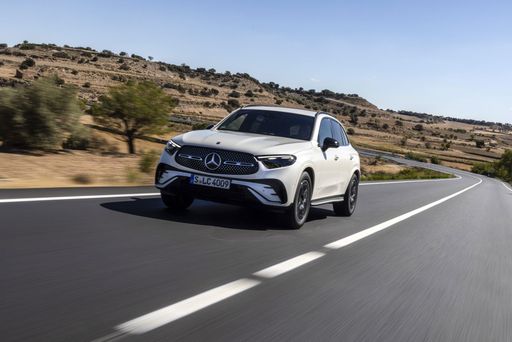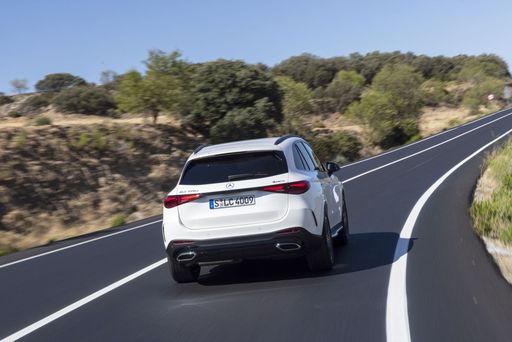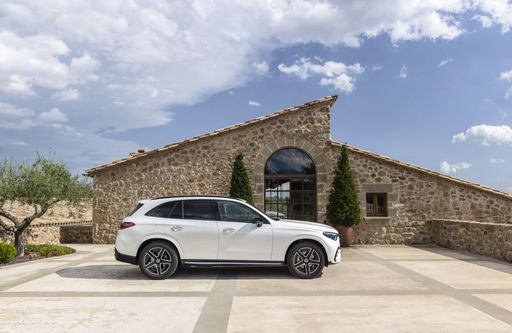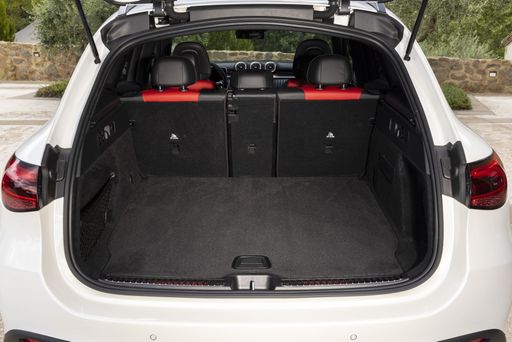Mercedes GLC vs VW Tiguan - Differences and prices compared
Compare performance (680 HP vs 272 HP), boot space and price (50300 £ vs 33300 £ ) at a glance. Find out which car is the better choice for you – Mercedes GLC or VW Tiguan?
Costs and Efficiency:
Price and efficiency are key factors when choosing a car – and this is often where the real differences emerge.
VW Tiguan has a decisively advantage in terms of price – it starts at 33300 £ , while the Mercedes GLC costs 50300 £ . That’s a price difference of around 17027 £.
Fuel consumption also shows a difference: VW Tiguan manages with 1.40 L and is therefore slightly more efficient than the Mercedes GLC with 1.60 L. The difference is about 0.20 L per 100 km.
As for electric range, the Mercedes GLC performs decisively better – achieving up to 714 km, about 588 km more than the VW Tiguan.
Engine and Performance:
Power, torque and acceleration say a lot about how a car feels on the road. This is where you see which model delivers more driving dynamics.
When it comes to engine power, the Mercedes GLC has a clearly edge – offering 680 HP compared to 272 HP. That’s roughly 408 HP more horsepower.
In acceleration from 0 to 100 km/h, the Mercedes GLC is convincingly quicker – completing the sprint in 3.50 s, while the VW Tiguan takes 5.90 s. That’s about 2.40 s faster.
In terms of top speed, the Mercedes GLC performs slightly better – reaching 275 km/h, while the VW Tiguan tops out at 242 km/h. The difference is around 33 km/h.
There’s also a difference in torque: Mercedes GLC pulls convincingly stronger with 1020 Nm compared to 400 Nm. That’s about 620 Nm difference.
Space and Everyday Use:
Beyond pure performance, interior space and usability matter most in daily life. This is where you see which car is more practical and versatile.
Both vehicles offer seating for 5 people.
In curb weight, VW Tiguan is to a small extent lighter – 1599 kg compared to 1910 kg. The difference is around 311 kg.
In terms of boot space, the VW Tiguan offers hardly perceptible more room – 652 L compared to 620 L. That’s a difference of about 32 L.
In maximum load capacity, the Mercedes GLC performs minimal better – up to 1740 L, which is about 90 L more than the VW Tiguan.
When it comes to payload, Mercedes GLC a bit takes the win – 600 kg compared to 533 kg. That’s a difference of about 67 kg.
Who wins the race in the data check?
The Mercedes GLC is far ahead overall in the objective data comparison.
This result only shows which model scores more points on paper – not which of the two cars feels right for you.
Costs and Consumption
View detailed analysis
Engine and Performance
View detailed analysis
Dimensions and Body
View detailed analysis

Mercedes GLC
Mercedes GLC
The Mercedes GLC blends plush cabin comfort and composed road manners into an SUV that feels more grown-up than it looks. It won’t shout for attention, but will quietly please buyers who want refinement, usable space and a touch of luxury without the drama.
details




VW Tiguan
The VW Tiguan blends sensible family practicality with a dash of German polish, delivering a calm, reassuring ride and a cabin that never feels like an afterthought. For buyers who want an SUV that’s easy to live with yet still nicely dressed, the Tiguan is the grown‑up choice that keeps a cheeky wink in reserve.
details





Costs and Consumption |
|
|---|---|
|
Price
50300 - 126600 £
|
Price
33300 - 51900 £
|
|
Consumption L/100km
1.6 - 9.9 L
|
Consumption L/100km
1.4 - 8.4 L
|
|
Consumption kWh/100km
14.9 - 16.6 kWh
|
Consumption kWh/100km
-
|
|
Electric Range
12 - 714 km
|
Electric Range
118 - 126 km
|
|
Battery Capacity
94 kWh
|
Battery Capacity
19.70 kWh
|
|
co2
0 - 225 g/km
|
co2
32 - 190 g/km
|
|
Fuel tank capacity
49 - 65 L
|
Fuel tank capacity
45 - 58 L
|
Dimensions and Body |
|
|---|---|
|
Body Type
SUV
|
Body Type
SUV
|
|
Seats
5
|
Seats
5
|
|
Doors
5
|
Doors
5
|
|
Curb weight
1910 - 2535 kg
|
Curb weight
1599 - 1890 kg
|
|
Trunk capacity
390 - 620 L
|
Trunk capacity
490 - 652 L
|
|
Length
4716 - 4845 mm
|
Length
4539 mm
|
|
Width
1890 - 1913 mm
|
Width
1842 - 1859 mm
|
|
Height
1603 - 1647 mm
|
Height
1656 - 1658 mm
|
|
Max trunk capacity
1335 - 1740 L
|
Max trunk capacity
1486 - 1650 L
|
|
Payload
475 - 600 kg
|
Payload
460 - 533 kg
|
Engine and Performance |
|
|---|---|
|
Engine Type
Petrol MHEV, Plugin Hybrid, Diesel MHEV, Electric
|
Engine Type
Petrol, Petrol MHEV, Diesel, Plugin Hybrid
|
|
Transmission
Automatic
|
Transmission
Automatic
|
|
Transmission Detail
Automatic Gearbox, Reduction Gearbox
|
Transmission Detail
Dual-Clutch Automatic
|
|
Drive Type
All-Wheel Drive
|
Drive Type
All-Wheel Drive, Front-Wheel Drive
|
|
Power HP
186 - 680 HP
|
Power HP
130 - 272 HP
|
|
Acceleration 0-100km/h
3.5 - 9 s
|
Acceleration 0-100km/h
5.9 - 10.6 s
|
|
Max Speed
208 - 275 km/h
|
Max Speed
210 - 242 km/h
|
|
Torque
320 - 1020 Nm
|
Torque
220 - 400 Nm
|
|
Number of Cylinders
4 - 6
|
Number of Cylinders
4
|
|
Power kW
137 - 500 kW
|
Power kW
96 - 200 kW
|
|
Engine capacity
1991 - 2989 cm3
|
Engine capacity
1498 - 1984 cm3
|
General |
|
|---|---|
|
Model Year
2025 - 2026
|
Model Year
2024 - 2025
|
|
CO2 Efficiency Class
F, G, B, A
|
CO2 Efficiency Class
G, D, E, F, B
|
|
Brand
Mercedes-Benz
|
Brand
VW
|
What drive types are available for the Mercedes GLC?
The Mercedes GLC is offered with All-Wheel Drive.




